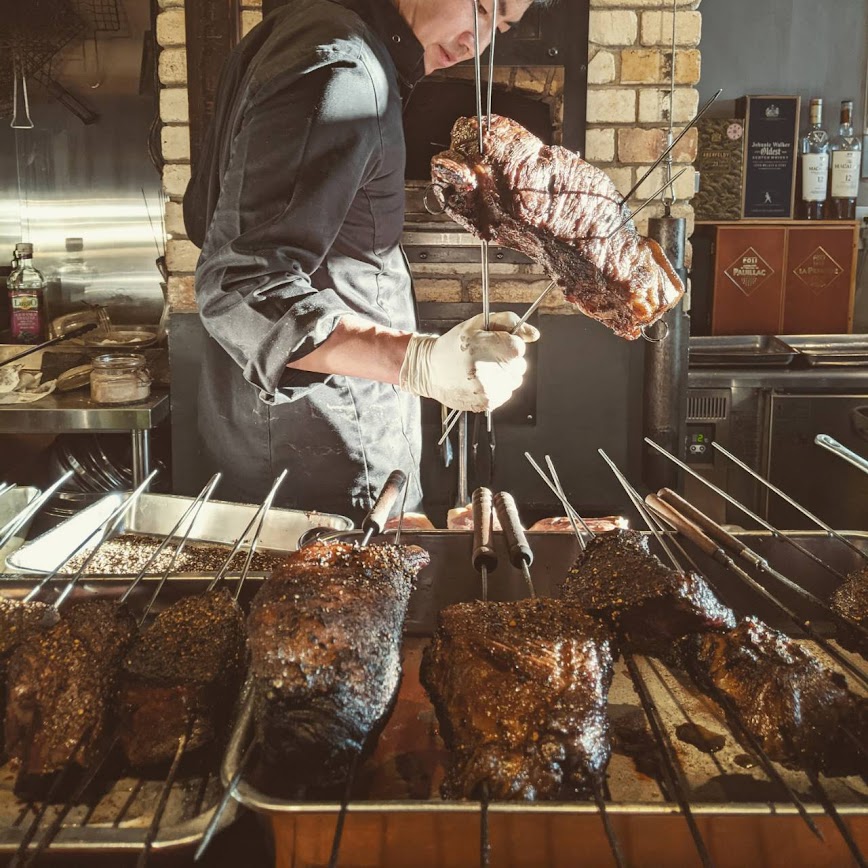2024.06.19
Kishu-binchotan charcoal brick oven
 baron opened 7 years ago in May 2017.
baron opened 7 years ago in May 2017. The restaurant opened as a charcoal grill steakhouse that grills Kobe beef in charcoal brick oven made of Kishu-binchotan charcoal designed by myself.
Kishu binchotan is an intangible cultural heritage.
Binchotan is charcoal made from oak trees (ubamegashi). The brick oven is filled with oak wood without any space between the wood and heated, then covered with potassium to block the air, and cooled slowly over a long time.
The charcoal is tightly packed to prevent air from entering when it cools.
Diamond has a carbon ratio of 100%. Binchotan has a carbon ratio of 99.8%, the same ratio as graphite and other materials used in spaceships, etc., and can be said to be almost a metal. When tapped, the charcoal makes a metallic “clang” sound. As a side note, diamonds burn up when thrown into the brick oven
Binchotan is a very rare and expensive burning material, capable of producing temperatures close to 1,000 degrees Celsius.
It is tasteless and odorless, and the difference in heat frequency allows it to burn more strongly on the surface than normal charcoal.
It emits electromagnetic waves, which are reflected inside the brick oven to create the best heating environment for a block of steak.
Binchotan is now getting popular in France, Europe, and other countries.
Italy, Argentina, and Spain also have wood-fired ovens, but the Kishu-binchotan brick oven originated in Kobe, Japan. Charcoal is characterized by the smell of the wood it is made from, while binchotan does not, so it cannot be used as a substitute for food,
It is outstanding in that it brings out the best flavor of the ingredients, and can be used in a grilling method that makes the best products stand out even more.
Binchotan is also used in the Japanese tea ceremony to boil water. The heat from binchotan allows for a clear roasting process, and it also provides any bad flavors, so that the meat can be cooked to its peak flavor without any impurities.
Binchotan is made manually in the mountains by people in whole seasons. People use it a lot in winter due to the cold weather, which causes production to decline in comparison to consumption.
The production of Kishu-binchotan brick oven is where there are only a few makers and very few oak trees, making them very expensive.
The thickness of the binchotan used will also affect the amount of heat it produces. The speed of burnout and the time it takes to reach a high temperature vary, and baron uses two or three different thicknesses of charcoal depending on the meat to be grilled.
When the fat of the meat falls onto the hot charcoal, the fire rises. The charcoal is burned at a high temperature during the burning process, so the fat burns off quickly.
The basic rule of charcoal grilling is to keep the red fire out, no matter where you go to eat at a charcoal grill,
This is a very rudimentary subject that you will learn on your first day at work,
When I continue to cook meat for hundreds of thousands or even millions, create something that is not just a monotonous process, but something that you can put a lot of thought and care into. Everything is not just what you can find in cookbooks, and each part of the meat has its own unique know-how. I think what you read in books and SNS media is only a small part of the story.
Binchotan is a burning material that must be used with care, but if it is used only half-heartedly, the burning process will be hazy, so we consider it important to prepare various aspects of the meat before grilling, including the method of grilling, the condition of the meat before grilling, and the inside of the meat, in order to reach the moment of grilling.
I think Japanese people try to accomplish something in any fields. We are grateful to the customers who come to baron every day to enjoy our steaks, to the producers, butchers, binchotan producers, and everyone around us, and we hope that we can continue to make many customers happy through this kind of work every day.
We are always face to Kobe Beef with integrity and striving for the best expression of it day by day.
kobebeef steak / baron Owner, Yusuke Inoue








